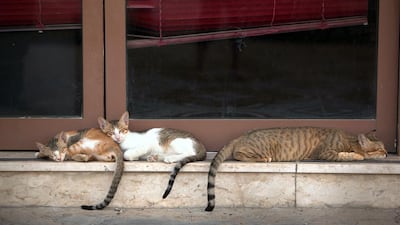DUBAI // While it may seem like a good thing to “rescue” a cat from the streets, experts are warning animal lovers that their good intentions may do more harm than good.
Not every stray is in need of rescuing they said, and too many felines end up abandoned at vet clinics or even “hoarded” in apartments or villas.
Dr Dieter Malleczek, owner of Blue Oasis Veterinary Clinic, said many Oriental species such as the Arabian Mau were perfectly adapted to the UAE’s climate and often did not need help.
“These cats have adapted to the heat and unless the animal is injured or in immediate danger it should not be taken out of its environment,” he said.
“This is why we recommend TNR (trap, neuter, release) programmes in which the cat is fixed and returned to the same spot it was found as soon as possible.”
Returning a cat to a familiar location is essential for survival as it would know where to find food and water.
However, Dr Dieter said pedigree cats, such as long-haired Persians, will most probably not survive without human support.
“Some of these are pets dumped when their owners move away or can no longer afford them and it’s cruel for them to be outside,” he said.
While people who rescue cats have their hearts in the right place, Dr Dieter said, they must be fully committed to properly looking after the animal.
“My job is to treat and cure animals, not to have them dumped at the clinic and stuck in cages,” he said.
“People should make sure they can find it a home or temporary fostering.”
Dr Dieter said people had given fake names and phone numbers after leaving rescued cats and never returned.
He also warned animal lovers against taking responsibility for every stray cat they encountered.
“We know of five or six hoarders in Dubai, some of whom were reported to Dubai Municipality,” he said.
“It’s not healthy, there is cross contamination of diseases, an overwhelming smell of ammonia, and in many cases the hoarder ends up in a financial crisis.”
Animal welfare volunteer Katy Lefei said stray cats sometimes end up in a worse situation after being taken in by people who intended to “rescue” them.
“Cats are often locked up at clinics – often in proximity to many other cats. Some ‘rescuers’ have no plan for its life, so the cat stays indefinitely. Some are lost or abandoned pets, some will be socialised and suitable for rehoming, some not. The responsibility must lie with the rescuer, who should release the cat or complete the rescue and find it a home.”
Ms Lefei said there was an increasing number of instances in which volunteers had to take cats from hoarders’ homes.
“In most cases the cats are in poor condition and suffering,” she said.
“Intervention is also needed when rescuers refuse to take a vet’s advice to euthanise. Keeping sick and dying cats to suffer for prolonged periods in vet cages, that is no solution at all – that is animal abuse.”
dmoukhallati@thenational.ae

